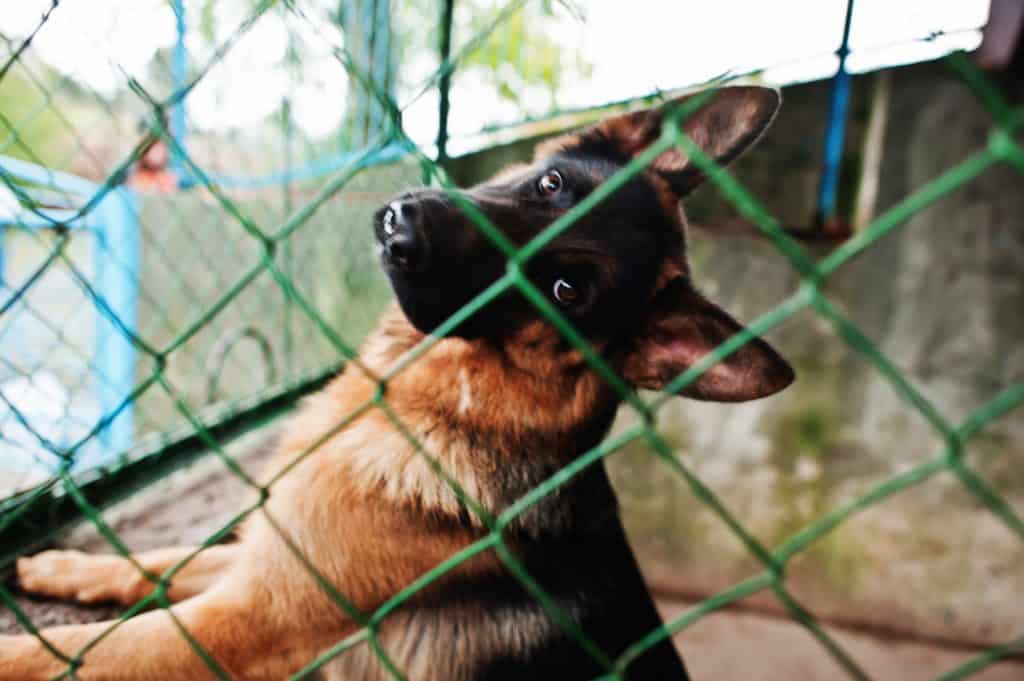How Long Do German Shepherds Reproduce?

Perhaps you are new to the German Shepherd breed or maybe your dog slipped out one day and you have found out she is expecting puppies. Whatever the case may be, you may be starting to think it may be fun to breed your German Shepherd, but want to know how to do it properly. As a German Shepherd owner myself, I have often wondered about some of these questions myself.
But, how long do German Shepherds actually reproduce?
Once female German Shepherds experience their first heat cycle, and males sexually mature, a German Shepherd can reproduce their whole life. However, it is recommended that you should stop breeding your German Shepherd when they reach eight to ten years of age depending on the sex of the dog.
So, how does age really play into all of this?
How Can Age Affect a German Shepherd’s Pregnancy?
If you are looking to breed your female German Shepherd, you must first have a clear understanding of what if often referred to as her “Heat Cycle”. This is also called the Estrus Cycle.
Your German Shepherd’s heat cycle can be compared to a woman’s menstrual cycle, as it is similar in nature that because it lets you know a German Shepherd is ready to be bred.
Once your German Shepherd is about six years of age, she will experience her first heat cycle. This should happen about two times a year – about six months apart for the rest of her life.
However, there is a certain period of time in your German Shepherd’s life when you should really be paying attention to when she is in heat.
From about ages two to eight, you can acceptably breed your German Shepherd, giving her breaks between cycles. Perhaps breeding her once a year.
At these ages, a female German Shepherd is the most sexually mature and more likely to have healthier pups.
However, the older a German Shepherd becomes, the more fragile her eggs become – and the more complications begin to arise with pregnancy for both the mother and her puppies.
The older she gets, the more susceptible to excessive blood loss during the birthing process she may become or even stillbirths.
Also as your German Shepherd ages, the less milk she is likely to produce while being continually bred.
This poses a problem for the health of her puppies as well as for her.
So, as you go about breeding your German Shepherd, you should be paying attention to how healthy her pregnancies are between heat cycles.
Male German Shepherds can be bred a bit longer than female German Shepherds by about two years before their sperm is no longer viable.
No matter the case or gender of the dog, before breeding your GSD, you should always consult a veterinarian.
Why Should I Stop Breeding My GSD?
There are many factors that go into making the decision to stop breeding your German Shepherd. But foremost and most importantly among those reasons is your German Shepherd’s health.
No matter the gender of your dog, health becomes a huge risk factor for your dog and for their puppies the longer you breed them.
As your dog matures, he or she will reach a point where their sperm and ovum are no longer viable.
This means that they have stopped producing each of these as much, and the quality deteriorates over time just as it does in humans.
This means that your dog’s chances of having another litter become slimmer and slimmer the more the older they become.
There are also several risk factors involved as your German Shepherd gets older.
In some cases, a mother may have a complicated pregnancy. Age factor falls under this. Meaning, as a female German Shepherd ages, she has a higher chance of having stillborn puppies and other complications of the sort.
Over time you may notice your German Shepherd developing health problems as well. Before this even begins to occur, you should be checking on the health of each litter. As your German Shepherd’s health deteriorates, it can affect how the puppies are carried.
If your German Shepherd has a litter on the way and is exhibiting any health problems. talk with your vet. Try to understand that this can affect not only your dog but the puppies as well.
You should always be taking your GSD to the vet regularly. Especially if you plan to breed them for an extended period of time.
Chances are if you are uneasy about breeding your German Shepherd any further, it is time for you to stop. But you should always consult with a veterinarian first.
Knowing When it is Time to Stop Breeding

As has been mentioned above, your German Shepherd’s health should be valued above anything else during the breeding process.
You should consider stopping the breeding of your German Shepherd when they reach about eight years of age. When breeding after this age, health becomes a huge hazard for both parent and puppy.
When we breed a dog too often or for too long to the point it is causing major health problems – we refer to this process as “overbreeding” and “inbreeding”.
This can be done to both male and female German Shepherds, and it can be seen all the time all over the world by anyone.
Perhaps you have heard of a “Puppy Mill” puppy. These puppies generally come from a litter where the mother or father (or even both) have been bred too many times and for too long.
As such, when we purchase Puppy Mill puppies, we often see these puppies as having health problems down the road that may be the case of malnourishment from a mother’s trouble with lactation.
These puppies could also have health problems due to infection, or even inherited diseases if a parent’s genetics have not been considered before bleeding.
No matter what, before we start to recognize conditions in the puppies, we generally start to recognize conditions in the parents.
German Shepherds are especially susceptible to certain conditions caused by too much breeding especially when age plays in as a major factor.
So, what kinds of conditions can occur as a result of inbreeding and overbreeding?
- Osteoarthritis: Found to be one of the most common results of over breeding. This condition causes deterioration of cartilage around the joints, thought to be caused by breeding for specific traits such as a sloping back.
- Hip Dysplasia: The malformation of the Hip Joints which could eventually cripple your dog.
- Inter-Vertebral Disc Disease: A condition in which the vertebrae herniate. Causing the vertebrae to move into the spinal cord space. In severe cases, this can cause paralysis.
- Elbow Dysplasia: A health problem caused by the malformation of the elbow joints. Similar to Canine Hip Dysplasia.
Overbreeding is a good reason that we should be giving our dogs time between heat cycles to recover. You may even skip a cycle or two to allow her to recover.
If you believe your dog or their puppies are exhibiting any of these symptoms, take them to vet. It’s probably time for you to stop breeding your German Shepherd.
Overbreeding is an epidemic. Before you consider breeding your German Shepherd, really take the time to understand the breeding process and how age can play a part in keeping these dogs the healthiest and happiest they can be.
Related Questions:
At what age can you start to breed a German Shepherd?
Typically at about 2 years of age, you can begin to breed your German Shepherd. When doing so, make sure to take all of the necessary precautions to ensure your dog the best health during and after her pregnancy.
How long are German Shepherds pregnant?
German Shepherds have a slightly longer gestation period than smaller dog breeds. They can typically stay pregnant for up to 63 days. But depending on your dog, the time span can vary a little bit.
When should I have my German Shepherd spayed/neutered?
You should typically wait until about six to nine months of age before thinking of spaying or neutering your German Shepherd puppy. However, if your dog is a male, he can really be neutered at any time if you are keeping him happy and healthy.
